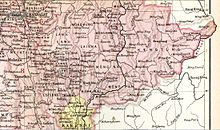Kenghkam

| Kenghkam State | |||||||||
|---|---|---|---|---|---|---|---|---|---|
| State of the Shan States | |||||||||
| 1811–1882 | |||||||||
 Keng Hkam State in an Imperial Gazetteer of India map | |||||||||
| Capital | Keng Hkam | ||||||||
| Area | |||||||||
• 1901 | 432.5 km2 (167.0 sq mi) | ||||||||
| Population | |||||||||
• 1901 | 5,458 | ||||||||
| History | |||||||||
• State founded | 1811 | ||||||||
• Annexed by Mongnai State | 1882 | ||||||||
| |||||||||
Kenghkam or Keng Hkam (also known as Kyaingkan) was a Shan state in what is today Burma. The capital was the town of Keng Hkam, located by the Nam Pang River.[1]
History
[edit]Kenghkam was initially a tributary of the Konbaung dynasty. It was founded in 1811 and was located north of the sub-state of Kengtawng. The state was occupied by Mongnai State from 1870 to 1874 and again from 1878 to 1882, when it was annexed directly.[2]
Rulers
[edit]The rulers of the state bore the title Myoza.[3]
- 1811 – 1854 Bodaw Sao Hkam Yi
- 1855 – 1864 Sao Hkun Mwe
- 1864 – 1870 Naw Hkam Leng
- 1870 – 1870 incorporated into Möngnai
- 1874 – 1878 Sao Hkun Long
- 1878 – 1882 incorporated into Möngnai
- 1882 – c.1889 Sao Naw Süng
- c.1889 – 1905 Hkun Un (b. 18.. - d. 1905)
- 1905 – 19.. Hkun Nawng Hkam (b. 1891 - d. 19..)
- 1905 – 1914? Sao Nang Tip Htila (f) -Regent
See also
[edit]References
[edit]- ^ Imperial Gazetteer of India, v. 15, p. 200.
- ^ "WHKMLA : History of the Shan States". 18 May 2010. Retrieved 21 December 2010.
- ^ Ben Cahoon (2000). "World Statesmen.org: Shan and Karenni States of Burma". Retrieved 21 December 2010.
21°52′0″N 97°22′0″E / 21.86667°N 97.36667°E